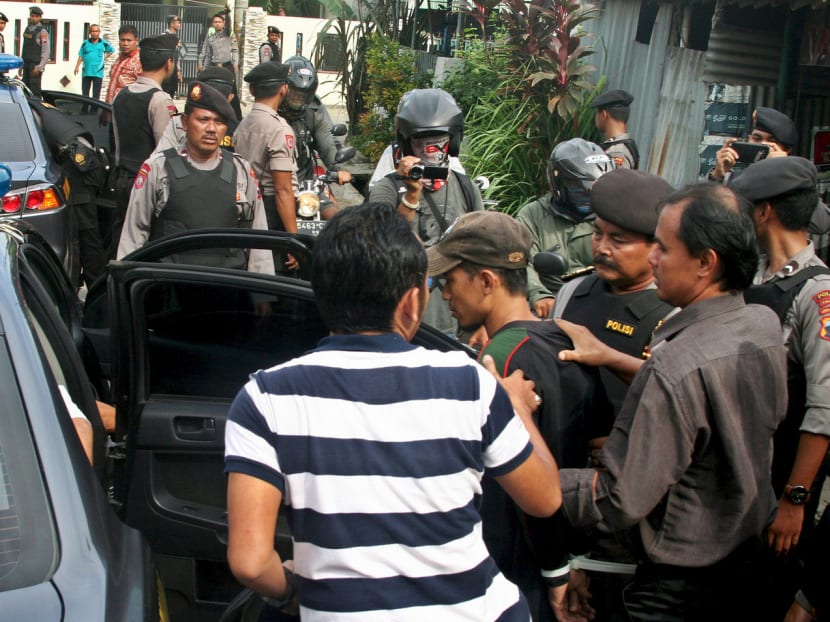Experts cast doubt over Indonesian General’s IS comments
SINGAPORE — The Indonesian military chief’s statement that militant group Islamic State (IS) has a presence in all but one of the country’s provinces has been called into question by analysts, with some noting it might be an attempt to discredit the police in its fight against terrorism.

Police escorting a man who was arrested in Tegal, Indonesia, on Jan 15, last year, over links to an attack by the IS in Jakarta. Since then the country has suffered a string of IS-inspired attacks. Photo: Reuters
SINGAPORE — The Indonesian military chief’s statement that militant group Islamic State (IS) has a presence in all but one of the country’s provinces has been called into question by analysts, with some noting it might be an attempt to discredit the police in its fight against terrorism.
General Gatot Nurmantyo said on Monday that there are clandestine IS cells across the sprawling Indonesian archipelago, save for the predominantly Christian province of Papua.
“After observation, we see that in almost every province ... there are already IS cells, but they are sleeper cells,” he told reporters in Jakarta, without revealing his sources. “These sleeper cells can easily join up with other radical cells,” he said, adding that they could be activated at any time.
Experts have cast doubt over the general’s comments.
“Nurmantyo’s comments are somewhat alarmist … (as) it is open to debate if there are actual IS sleeper cells in 33 of Indonesia’s (34) provinces,” said Mr Todd Elliott, a terrorism analyst with Jakarta-based Concord Consulting.
“It is more certain that there are supporters of the terrorist group throughout the country, in addition to those who are radicalised and support the same goals as IS. Most of those are believed to be people who support IS, but are not inclined to engage in violence.”
Nevertheless, Mr Elliot cautioned that a “small percentage of these people engage in violent jihadism and a handful are determined enough to sacrifice their lives for the terrorist cause”.
Terrorism analyst Jasminder Singh believes, however, that General Nurmantyo’s comments should not be downplayed completely.
“The demonstrations against Jakarta’s former governor Basuki Tjahaja Purnama last year are a good indicator that the ideology of Islamism is very deep-rooted and has been exploited for political objectives,” Mr Singh, who is with the S Rajaratnam School of International Studies, told TODAY.
“The same ground can also be easily exploited and mobilised by radicals, especially the IS, which have many factors to exploit, such as poverty, corruption and the appeal of the ideology that posits that jihadists are doing a service for mankind.”
Mr Singh added that as the IS loses ground in Iraq and Syria, the threat of returning fighters is “real” and therefore cannot be ignored.
Governments across the region have been on high alert since IS-linked militants overran the southern Philippine city of Marawi about three weeks ago.
A gun-and-bomb attack that killed four people in Jakarta last year marked the first IS strike in the region. There has since been a string of small, IS-inspired attacks in Indonesia, the latest of which were twin suicide bombings at a Jakarta bus station that killed three police officers last month.
Indonesian Defence Minister Ryamizard Ryacudu said earlier this month that there are some 200,000 IS sympathisers in South-east Asia, and as the world’s most populous Muslim country, Indonesia is a “prime target” for the IS.
He also said that of the 1,200 IS operatives in the Philippines, about 40 are from Indonesia. The Philippine authorities have also named seven Indonesians allegedly involved in the Marawi battle.
While IS poses a clear and present danger to Indonesia, analysts believe that Gen Nurmantyo’s statement was probably made to undermine the National Police, which has been at the forefront of the country’s fight against extremism.
The military could then get a bigger share of the nation’s counter-terrorism pie, said Mr Elliot.
“By claiming how widespread IS cells are in Indonesia, the general is in effect implying that the current strategy to combat terrorism and radicalism is flawed,” Indonesian political observer and businessman Johannes Nugroho told TODAY.
“This is interesting in light of his earlier comment that a revised law on terrorism which neglects to give the military a role would be a mistake. Gatot is insinuating that the National Police, especially the anti-terrorism unit Densus 88, has been negligent in fighting terrorism.”
Top Indonesian leaders such as President Joko Widodo have, however, praised Densus 88 for its campaign against militants.
Mr Nugroho previously wrote that Indonesia’s police force is entitled to its own independent budget, which is bigger than what the three military branches get. For example, in 2013, the police received 47 trillion rupiah (S$4.9 billion) in government funding, while the military had to split its budget of 96.4 trillion rupiah among the three services.
Moreover, Indonesia’s current law on terrorism has the National Police and the National Counter Terrorism Agency at the forefront of the fight against extremism, with the armed forces playing only a supporting role.
Gen Nurmantyo has called for a revision to this law, which he says is ineffective against terrorism.
Earlier this month, he noted that it would be “foolish” for Jakarta to combat militants under the existing legal framework, whose revision is being debated in Parliament.
The military chief is no stranger to controversy.
In January, he unilaterally suspended defence cooperation with Australia over a military row, and this led to Mr Widodo describing his defence chief as “a little out of control”, said sources. WITH AGENCIES






